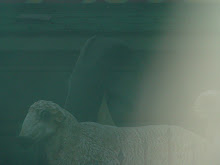
12.14.08
sunday, 6pm
-just stepped onto the train and into my seat- happy to know that my body will make its way back from where it came. i'm sitting across from 2 young men- right across- in seats facing each other- two sets of legs for each quantity of leg room- hardly developed for the comfort of international strangers on a 23hr ride. to go with it a strange and maddening frequency is present all around me and my new friends look around curiously for its source. if nothing else, the company proves that i am not the only one. i'm eyeing the seats around me. i need an upgrade in comfort.
630pm
on my way- ripped ticket, some thousand km of crawling transportation behind me. a new friend arrived in the meantime, making this a tight fitting foursome. no seatback table to write on, i'm cramped up- 2 books, a notebook, and a manuscript in my lap, my camcorder around my neck, the only thing i can't bear to lose. the young man in front of me, Mustafa, speaks some English and so our physical situation has become slightly more comfortable in conversation. something hit me in the stomach, the throat, hearing his phone call, hearing the verb for eat, thinking he is talking to his mother at home, in Sivas, some 15hrs away, talking about what he would eat after his travel. and the feeling was the memory of me doing something similar once upon a time, on trips back from Ohio or Southern Illinois. the feeling's amelioration came with a familiar face, the çay man i spent 34 hrs with on the way to Istanbul, strolling through the aisle again, seeing me and sharing a moment of confusion- you, again, you can't be serious.
645pm
w/ the lack of leg room, i'm resigned to let them lay in the aisle and being right next to the bathroom and exit, they interrupt a steady stream of passengers. passengers interrupt my recline. the possibility of sleep or comfort on this trip dims, although i might just walk back to Ray's cafe (that moving diner) throw down something and pass out in that relatively comfortable booth.
810pm
warm after soup and çay in Ray's restaurant car where i'll stay as long as i feel welcome. my nails are longer than they've been in years. my beard overgrown, my hair a mess like always, as i look at myself and the darkness beyond the window. its only been 10 days of travel, but the distance and time spent on the move make it feel like a month.
12.15.08
monday, 515am
i'm growing impatient with this terrible ride.
635am
Sivas all covered in snow, moons and stars fading. the best and worst of a country down the train line.
715am
when i was young- a boy's age- a school day snowed out- i'd think of it all and create my next monster- he carried himself from one white object to another with a small but critical ability to leap. it could lead him anywhere on a snow day- here, especially in my living room, next to the fire- all that snow on the porch, through the window, the porcelain snowman on the mantle, the whiteness of the pages lying in front of me. in me, this skin a whiter shade.
425pm
i'm not sure if that sound is the train car rubbing against the packed snow or a dog being beaten to death in the car ahead of mine. neither would surprise me. almost home.







